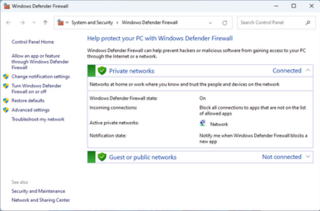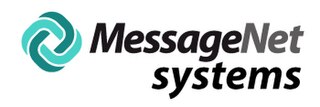Simple Network Management Protocol (SNMP) is an Internet Standard protocol for collecting and organizing information about managed devices on IP networks and for modifying that information to change device behaviour. Devices that typically support SNMP include cable modems, routers, switches, servers, workstations, printers, and more.
Voice over Internet Protocol (VoIP), also called IP telephony, is a method and group of technologies for voice calls, the delivery of voice communication sessions over Internet Protocol (IP) networks, such as the Internet.
Enhanced 911, E-911 or E911 is a system used in North America to automatically provide the caller's location to 911 dispatchers. 911 is the universal emergency telephone number in the region. In the European Union, a similar system exists known as E112 and known as eCall when called by a vehicle.

A voicemail system is a computer-based system that allows users and subscribers to exchange personal voice messages; to select and deliver voice information; and to process transactions relating to individuals, organizations, products, and services, using an ordinary phone. The term is also used more broadly to denote any system of conveying a stored telecommunications voice messages, including using an answering machine. Most cell phone services offer voicemail as a basic feature; many corporate private branch exchanges include versatile internal voice-messaging services, and *98 vertical service code subscription is available to most individual and small business landline subscribers.

OnStar Corporation is a subsidiary of General Motors that provides subscription-based communications, in-vehicle security, emergency services, turn-by-turn navigation, and remote diagnostics systems throughout the United States, Canada, China, Mexico, Europe, Brazil, Colombia, Argentina and the Gulf Cooperation Council countries.

A security alarm is a system designed to detect intrusions, such as unauthorized entry, into a building or other areas, such as a home or school. Security alarms protect against burglary (theft) or property damage, as well as against intruders. Examples include personal systems, neighborhood security alerts, car alarms, and prisons.
Remote administration refers to any method of controlling a computer from a remote location. Software that allows remote administration is becoming increasingly common and is often used when it is difficult or impractical to be physically near a system in order to use it. A remote location may refer to a computer in the next room or one on the other side of the world. It may also refer to both legal and illegal remote administration.

Windows Firewall is a firewall component of Microsoft Windows. It was first included in Windows XP SP2 and Windows Server 2003 SP1. Before the release of Windows XP Service Pack 2, it was known as the "Internet Connection Firewall."

CDW Corporation, headquartered in Lincolnshire, Illinois, is a provider of technology products and services for business, government and education. The company has a secondary division known as CDW-G, devoted solely to United States governmental entities, such as K-12 schools, universities, non-profit healthcare organizations, State & Local and the Federal government.
Fleet management is the management of:
In computing, phoning home is a term often used to refer to the behavior of security systems that report network location, username, or other such data to another computer.

Sybase iAnywhere, is a subsidiary of Sybase specializing in mobile computing, management and security and enterprise database software. SQL Anywhere, formerly known as SQL Anywhere Studio or Adaptive Server Anywhere (ASA), is the company's flagship relational database management system (RDBMS). SQL Anywhere powers popular applications such as Intuit, Inc.'s QuickBooks, and the devices of 140,000 census workers during the 2010 United States Census. The product's customers include Brinks, Kodak, Pepsi Bottling Group (PBG), MICROS Systems, Inc. and the United States Navy. In August 2008.
Next Generation 9-1-1 refers to an initiative aimed at updating the 9-1-1 service infrastructure in the United States and Canada to improve public emergency communications services in a growing wireless mobile society. In addition to calling 9-1-1 from a phone, it intends to enable the public to transmit text, images, video and data to the 9-1-1 center. The initiative also envisions additional types of emergency communications and data transfer. This NG9-1-1 infrastructure is intended to replace the current services over time. The National Emergency Number Association (NENA) first identified the need for NG9-1-1 in 2000, and started development actions in 2003, and is nearing full definition and standards for NG9-1-1. Since 2006, the US Department of Transportation (DOT) in the United States and the Canadian Radio-television and Telecommunications Commission (CRTC) in Canada have been leading their respective initiatives, which include research and development projects aimed at advancing NG9-1-1. On January 24, 2013, the CRTC announced the first step toward a Canadian implementation of NG9-1-1 and, in March 2016, began a consultation with the public to discuss what services should be offered, who will play a role in offering these services and how these services should be paid for. Several US states have implemented versions of NG9-1-1, as of October 2013.
Bridging Systems Interface is a standard protocol for communicating with physical interfaces which attach analog or digital voice radios to digital data networks—known as 'Radio over IP'--to make easier the use of remote radios by local users, and the sharing of radios by multiple users, in the service of improving emergency communications interoperability. The standard is promulgated by the SAFECOM program in the US Department of Homeland Security's Office for Interoperability and Compatibility, specifically, the VoIP Working Group.

GroupWise is a messaging and collaboration platform from Micro Focus that supports email, calendaring, personal information management, instant messaging, and document management. The GroupWise platform consists of desktop client software, which is available for Windows,, and the server software, which is supported on Windows Server and Linux.
An emergency communication system (ECS) is any system that is organized for the primary purpose of supporting one-way and two-way communication of emergency information between both individuals and groups of individuals. These systems are commonly designed to convey information over multiple types of devices, from signal lights to text messaging to live, streaming video, forming a unified communication system intended to optimize communications during emergencies. Contrary to emergency notification systems, which generally deliver emergency information in one direction, emergency communication systems are typically capable of both initiating and receiving information between multiple parties. These systems are often made up of both input devices, sensors, and output/communication devices. Therefore, the origination of information can occur from a variety of sources and locations, from which the system will disseminate that information to one or more target audiences.

MessageNet systems is a privately held company which sells a primarily software-based product called "Connections" for facilitating an organization's emergency and routine communications.

Guardly is a Canadian-based security company with headquarters in Toronto. In July 2022, SmartLocksGuide.com acquired Guardly. The company designs and provides mobile safety and security solutions for enterprise organizations, campuses, and municipalities. It is best known for its mobile safety application that allows users to connect to security, public authorities and a list of emergency contacts when the safety app is activated. Guardly is also attributed as the first company to offer an indoor positioning system to locate users who are within a building during an emergency, and the first to offer a mass notification system that integrates with indoor positioning data to locate people in need of help. The company's technology was featured on the Discovery Channel’s Future Tech TV series.
InformaCast is a proprietary Voice over IP network protocol for live audio paging. The protocol allows endpoints to autonomously announce their presence and capabilities and configure themselves to play audio broadcasts. InformaCast was originally developed by Berbee and later spun off into a separate company as Singlewire Software.
VDIworks is an American software company founded in 2008 that provides services like desktop virtualization, desktop as a service (DaaS), networking, PCoIP and cloud computing.






